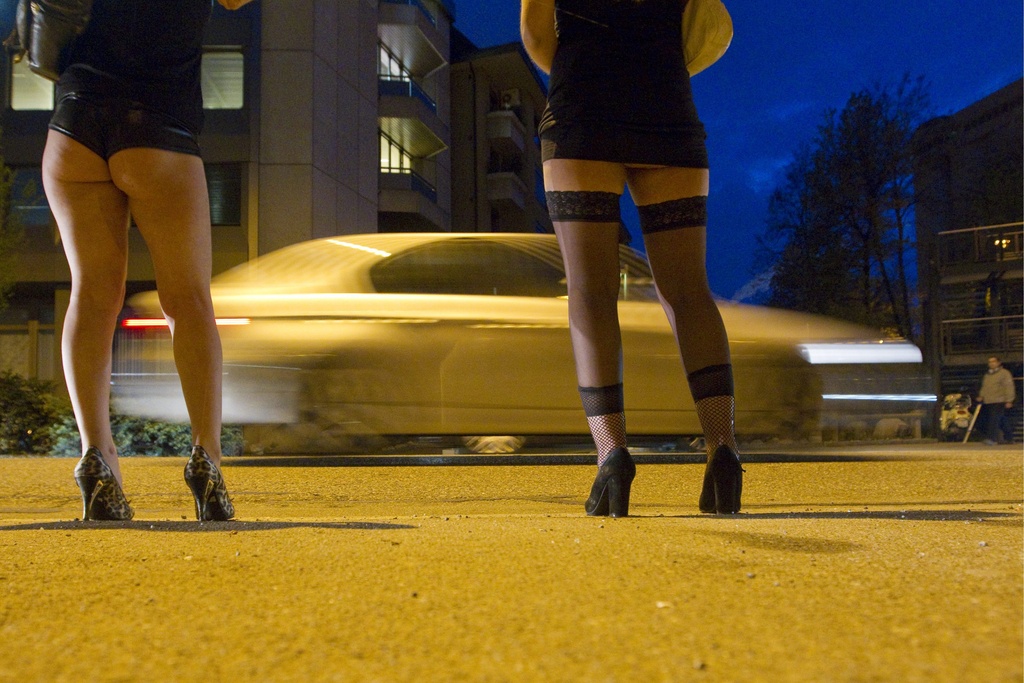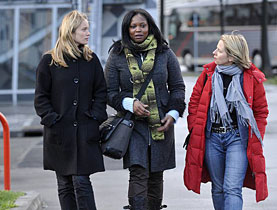Witnesses to get protection from revenge attacks

Trials in cases of suspected human trafficking, organised crime or terrorism often collapse because witnesses refuse to speak out in court.
And it is hardly surprising: anyone who testifies in a such trials may be threatened or even physically eliminated by the gangs involved.
But on June 7 the Swiss Senate approved a motion submitted to it by the government, calling for better witness protection procedures. This lays the basis for Switzerland to ratify the Council of Europe Convention on Action against Trafficking in Human Beings.
Switzerland does not currently fulfil the demands of the convention because witness protection is provided by the individual cantons, whose practice varies.
“Up to now there has been no real programme for protecting witnesses outside the trial itself, because there has been no legal basis for it,” Andreas Leuzinger of the Federal Police Office (fedpol) told swissinfo.ch.
The Senate decision means that such a basis can now be created, as long as the House of Representatives also agrees.
“The issue is important in trials of human traffickers and also in cases concerning organised crime, such as drug smugglers and weapons traders, or in terrorism,” Leuzinger explained.
Cooperation essential
“In cases of serious danger to the witness, his or her identity can be changed and the person can even be relocated to another country,” he said.
This would be necessary in cases where it would be impossible for a person to continue living unobtrusively in Switzerland, for example because of their skin colour, or their ethnicity.
Both Swiss and foreign citizens could be accepted into such a programme, which could also be extended to very close relations of a threatened witness, including children.
The public prosecutor involved in the case would apply during the trial for the person to be given witness protection, but he or she would have to cooperate willingly with the authorities, Leuzinger said.
People who refuse to testify in court, or who will not give information that could help elucidate a criminal offence, will not be given protection. And those who are themselves involved in criminal activities are unlikely to be accepted either.
Anyone who does not cooperate, or who does not obey the rules of behaviour once they have been accepted, will be dropped from the programme, because their safety cannot be guaranteed.
Changing identity means leaving everything behind, and never having any contact with friends again, he explained.
“It has happened before now that someone who has adopted a new identity as a protected witness has opened a Facebook profile under both his old and his new name,” Leuzinger said. In such cases the authorities are powerless to offer protection. But anyone can leave the programme voluntarily whenever they wish.
Specialist help
Once the law has been approved by both chambers, the government will set up a central witness protection office, with a staff of about ten specialists. The office will make the necessary investigations in Switzerland and abroad and also advise the cantons in dealing with the less difficult cases.
“Witness protection doesn’t mean in every case that the person receives a new identity. In less difficult cases it is enough to keep the person under surveillance during the trial, or just to change their name and address.”
The office would also offer advice about behaviour in almost all areas of life, Leuzinger said.
It is thought that there are likely to be between 10 and 15 cases a year in Switzerland where witness protection is necessary. But several persons could be involved in each case.
And sometimes it is not the witness who is in most danger.
“Relatives back home are often at greater risk, when someone in Switzerland speaks out against people trafficking,” Leuzinger admitted. So Switzerland is already working with foreign agencies and local authorities on the ground to protect these people.
He hopes that the new witness protection law will make it easier to solve serious crimes, since witnesses will then be more likely to speak out.
The cabinet submitted a federal witness protection law to the Senate as part of the European Convention on Action against Trafficking in Human Beings.
The new federal law on witness protection is necessary for Swtizerland to be able to ratify the convention, which it signed in 2008.
If the House of Representatives also agrees to the new law, it will come into force on January 1 2013.
Until then, the individual cantons will be responsible for witness protection measures.
The convention was drawn up to protect victims of trafficking and safeguard their rights, as well as to prevent trafficking and prosecute those engaged in it.
It applies to all kinds of trafficking, both national and transnational, for whatever purpose.
It includes an independent monitoring mechanism to ensure that signatories comply with its provisions.
It opened for signatures in 2005 and came into force in 2008, when it had been ratified by 10 states.
As of June 2011 it had been ratified by 34 states.
Switzerland is one of nine countries which have signed it, but not yet ratified it.
(translated from German by Julia Slater)

In compliance with the JTI standards
More: SWI swissinfo.ch certified by the Journalism Trust Initiative













You can find an overview of ongoing debates with our journalists here . Please join us!
If you want to start a conversation about a topic raised in this article or want to report factual errors, email us at english@swissinfo.ch.